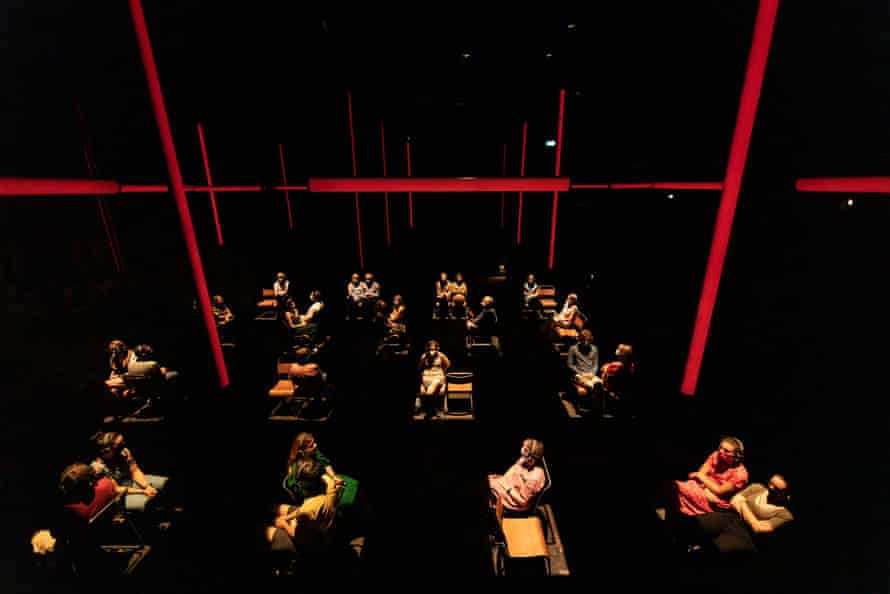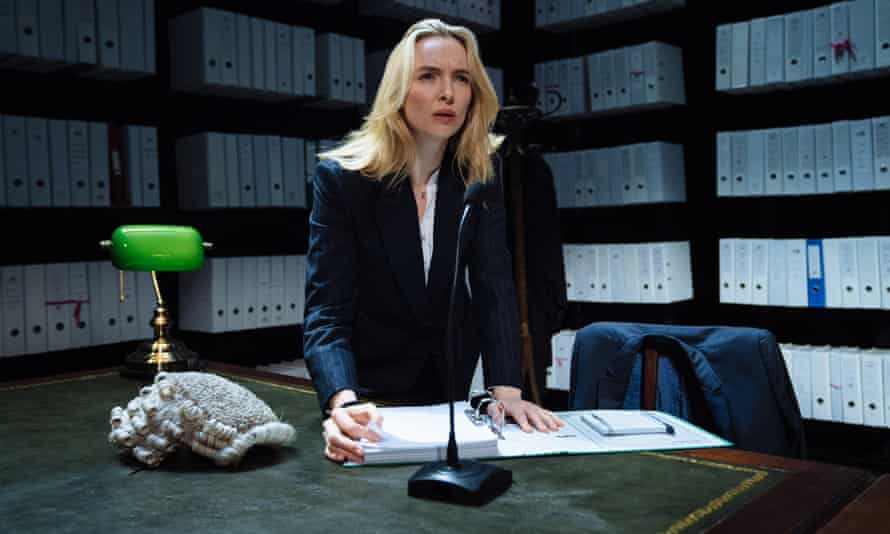Max and Ben Ringham had wildly clashing music tastes growing up. There were “sound wars” in their bedroom as a result. They did, however, pool their equipment – musical instruments, keyboards, samplers – which piled up high at one end of the room.
That pile turned into a mountain and then followed them into a shared London studio in their 20s when they decided to make music together. They have now been in a professional partnership of 25 years which began with composing drum’n’bass records, then making TV production music, to becoming one (or two, to be accurate) of the biggest names in sound and music composition for the stage.
They have worked with everyone from Jamie Lloyd (on the feted Pinter at the Pinter season in the West End) to David Rosenberg (of Darkfield). With Ella Hickson, they conceived the groundbreaking National Theatre production Anna, delivered through binaural headphones. Blindness at the Donmar Warehouse, an installation featuring Juliet Stevenson’s voice, was one of the most experimentally daring shows of the pandemic with its rumbling and thrumming layers of sound, while Pass Over, at the Kiln, carried ominous, buzzing notes to chime with the themes of existential fear in the play. More recently, they designed the sound for Prima Facie, starring Jodie Comer, which featured the harsh pelt of rain against dangerous notes of electronica.
The Ringhams have four years between them – Max is the older at 50 – but don’t have the power dynamic of a dominant/passive brother. They play a conversational tag when we meet – Max chipping into Ben’s thoughts, Ben building on Max’s ideas – which seems, well, almost orchestral. They have been on the receiving end of the repeated joke that they are one person parading as two: “People have said ‘I bet Ben or Max doesn’t exist,’” says Ben.
The brothers rose from a dynasty of sound. If there were music wars in their childhood bedroom, there were bigger battles playing out elsewhere in their north London family home. The children in the flat above theirs were into punk and three of them grew up to become professional musicians. Their father, John Ringham, was an actor and accomplished musician with a grand piano in the living room. “Dad listened to music relentlessly, so he’d either play the piano or turn on radios as he walked through the house, leaving each one on,” says Max.
Their two older sisters held the same passion: “Jessica was really into AC/DC, Hannah was into an eclectic range of stuff,” says Max, while their mother, Felicitas Ringham, a French literature academic, wrote dictionaries and books on semiotics.
When Max went to Belize for six months, Ben agreed to oversee his drum’n’bass work and was hooked by the time Ben returned: “I refused to give it up because I really enjoyed it.” At first, they lived off shared tins of beans and hustled for commissions. “We did a lot of library music [generic production music]. It was a really good discipline in making styles of music very quickly..” Ben adds: “It’s about being intuitive and trusting your ability to get on with it.”
Both sisters ended up going into the creative industry too; Jessica is a wig-maker while Hannah co-founded the theatre collective Shunt. At Shunt, the brothers developed a few sides of their practice, and took to creating immersive sound and music for theatrical spaces.
“Shunt was a complete artistic free for all,” says Ben, reflecting on how there were no distinctions between writers, directors or designers. “It was really exciting for us because we’ve always been more stimulated in an environment where people are discussing other things than just sound,” adds Max.
They still work to the mantra “why can’t we do it?” taken from those cross-disciplinary collaborations. There is no dividing line between composing music and creating sound design for them, or writing music versus writing a script. Their two latest projects are testimony to this hybridity. They have just finished co-writing music and scripts (with Dan Rebellato) for Exemplar, a series to be aired on BBC Radio 4 in August starring Gina McKee and Charlie Hardwick, among others, about a forensic audiologist. They are also working on a new musical with Tanika Gupta – she is writing the book, they the music.

As successful as their collaboration is, being brothers and colleagues has its strains too, although their financial agreement is set in stone. “We said early on regardless of who does what job it’s always 50% and there’s no discussion about it,” says Ben. “We talk constantly about parity and making sure that we look after that side,” adds Max.
Creatively, there is never a project that one of them will do alone. “At the conception stage we’ll talk through ideas, discuss palettes and sounds. But at the point where a show goes into technical rehearsals then generally one of us will take over,” says Max, adding that a director has only rarely expressed a wish to work with one or the other of them.
When they listen back to their sound and music from years ago they can’t always be sure who wrote what: “We’ll say ‘That’s really good, I’m sure I wrote that’ or ‘That’s rubbish – that one was you,’” says Ben, laughing.
The holy grail now is capturing sound that no one else has, they say, suddenly seeming like anoraks of the sound world. They will annoy their partners by stopping at a street corner to record a squeaky gate, a subway grate in New York or the wind whistling around an Antony Gormley sculpture in Folkstone, as one of them did the other week.
Recording it all on their phones is “not perfect but it doesn’t sound like anyone else, and that’s the currency,” says Ben. “Having something unique that no one else has – we’re quite obsessive about that,” adds Max, “and no one has the squeaky gate.”

